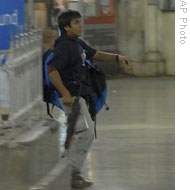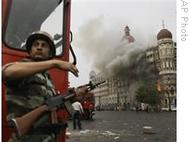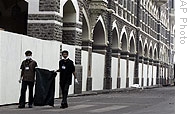voa标准英语2008-Mumbai Terrorists Aided by Security Lapses, Tech
搜索关注在线英语听力室公众号:tingroom,领取免费英语资料大礼包。
(单词翻译)
In the aftermath of the terror attacks, many in Mumbai are asking how a group of 10 to 15 assailants were able to carry out their brazen1 attack that included some of the city's most guarded landmarks2. Raymond Thibodeaux has this from Mumbai.The first chance to warn police of suspicious activity came at this boat launch known as Fisherman's Colony, less than a mile from the devastated3 Oberoi Trident hotel.
At about 9:00 p.m. Wednesday, a fisherman in this poor village said he saw strangers come ashore4 - four in an inflatable boat and two more in a speedboat. He spoke5 on condition of anonymity6, fearing reprisals7.
 |
| A gunman walks at the Chatrapathi Sivaji Terminal railway station in Mumbai, India, 26 Nov 2008 |
He said the six men looked young and athletic8. He said they had backpacks and duffel bags slung9 around their shoulders. He said one of the fisherman, instantly suspicious, asked them what they were doing, one of them turned around, saying: "Do not bother me. I am in a very bad mood."
He said the six men sped away headed north in two taxis.
About a half-hour later, two gunmen opened-fire at the city's busy main railway station, roughly a 20-minute drive in normal traffic from Fisherman's Colony.
Photographer Sebastian D'Souza, who works for the Mumbai Mirror directly across the street from the main railway station, ran to the station and snapped several photographs of the attackers, among the most iconic images of the terror attacks.
He said the assailants could have been stopped, but police and security guards at the station were reluctant to engage them. He said they were scared like everybody else, seeing that they were massively outgunned.
"They were not in a hurry, they were walking very coolly, firing from the hip10. If they saw somebody they just fired. Someone, at least 10 guys even with their revolvers or whatever they had, should have engaged them in a battle. We could have got them," he said.
 |
| An Indian soldier takes cover as the Taj Mahal hotel burns during gun battle between Indian military and militants11 inside the hotel in Mumbai |
He said one of the officers fired at the attackers and their response was swift: a hailstorm of bullets that killed a police officer and bookseller trying to lower the metal shutters12 of his stall.
In carrying out their attacks throughout Mumbai, the assailants were aided by security lapses13 and technology, analysts15 said. Their operation seemed to consist of diversionary targets to disperse16 police while they escaped to their primary targets.
Fahrang Jehari, the owner of the Leopold Café, a popular backpacker hangout where seven people were killed, said the café likely was not the attackers' primary target.
"It was just an opportunity to divert the attention of the cops. That is what I feel," he said. "If they wanted this to be a main target, they would have been here for a longer time and they would have caused more casualties over here."
Less than 50 yards from Leopold Café is the Colaba police station, where at least 22 officers were on duty, according to one of the officers there who asked not to be identified.
 |
| Workers look for forensic17 evidence outside Taj Mahal hotel in Mumbai, India, 01 Dec 2008 |
As investigators18 comb through the devastation19 of the attacks, clues are starting to emerge as to how the attackers relied on advanced technology like satellite mapping and software like Voice over Internet Protocol20, or VoIP, to stay in contact with their leaders without giving away their positions.
"This was technologically21 a pretty sophisticated group," explained Praveen Swami, a Mumbai-based terrorism analyst14. "They navigated22 their way using a state-of-the-art GPS system. Most of their rehearsals23 to familiarize themselves with Mumbai - because the 10-man team were not familiar with the city - was done on high-resolution satellite maps, so they would have a feel for the city's streets and buildings where they were going to."
But according to the executive director for the Institute for Conflict Management in New Delhi, Ajay Sahni, it was the delay in the response by Indian security forces that might have enabled their siege to last as long as it did.
He spoke to VOA by phone.
"The point really is how were they able to protract24 their operation right up to 60 hours. That is not defined by their capabilities25; it is defined by our response. What we did was cordon26 off the two hotels and the Nariman House. That allowed them free movement within these areas so they went around carrying out various massacres27, finding and killing28 individuals for almost 60 hours since the beginning of the operation," he said.
Sahni asked where is it written that terrorists cannot use the same technology that is available to just about anyone?
He said it appears the only people out of the loop on that are the Indian security forces.




